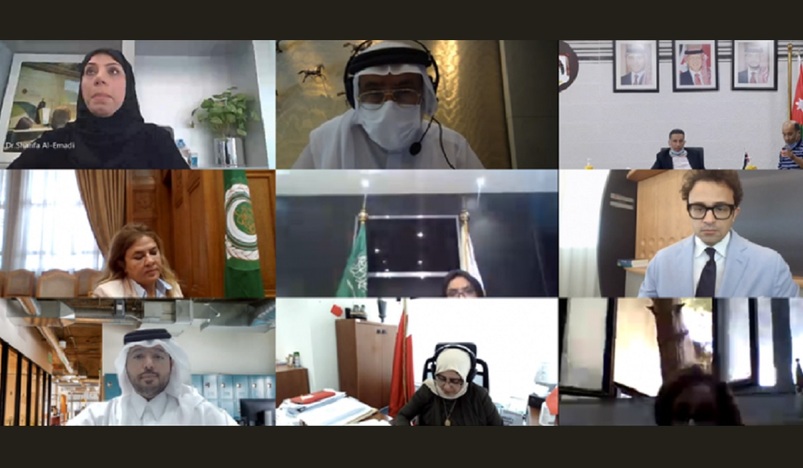
Participants during the 11th session of the Arab Family Committee, held via video conference.
Doha International Family Institute (DIFI), a member of Qatar Foundation, has outlined the most significant findings of its major study on marriage in the Arab world as it participated in the 11th session of the Arab Family Committee.
The findings of the new study, ‘Assessing Marital Relations during the First Five Years of Marriage in the Arab World’, call for reconsideration and reflection on the assumptions and actualities that are prevalent in the Arab world about the main causes of divorce. The study looks into what happens inside marital relationships in order to gain better understanding and avoid disintegration of marriages.
Most of those who participated in the survey, which included 414 participants from 19 Arab countries, considered that the intervention of parents and extended families is mainly positive, as it may provide material aid, support in child rearing and supportive care in cases of sickness. However, the percentage of intrusive intervention that may lead to disputes did not exceed 18% of participants.
The preliminary results summarised the main causes of early disintegration of marital relations as including emotional matters, difficulty in accepting a partner, differences in perceptions of reality, financial problems, work pressures and behavioural deviations.
The results also highlighted impressions of marriage:
• 35.57% of participants considered it a new and enjoyable life experience
• 30.32% considered it somewhat good, a gray area that is likely to develop into either a good impression or an early disintegration of marriage
• 37.11% mentioned negative impressions about the marital experience, describing it as “imposing more burdens and responsibilities”, “a tiring life experience that constantly entails problems and tensions”, or “a bitter/unhappy experience that caused mental illness”
This year’s session saw discussions on the strategies being issued by the League of Arab States, in the context of policies relating to family counselling, reducing domestic violence and strengthening household cohesion.
The Arab Family Committee’s agenda also devoted a slot to the study project currently being conducted by DIFI in cooperation and partnership with the Social Affairs Sector of the General Secretariat of the League of Arab States.
During the session, Dr. Sharifa Noaman Al Emadi, Executive Director, DIFI, said the institute was “focusing its efforts to advance knowledge about the Arab family, and to promote evidence-based policies at the national, regional and international levels, thus contributing to the establishment of educated and healthy societies, supported by strong cohesive families in Qatar and all Arab countries.”
“In appreciation of these efforts, we were honoured to receive the first Best Organisation to Support Family Issues in the Arab Region prize for 2020. Such a recognition is a driver and an incentive for us to conduct more collaborative work to serve Arab family issues,” she added.
During her participation in the session proceedings, Dr. Al Emadi called for using DIFI’s studies for the benefit of the Arab family, by putting in place an indicative marital rehabilitation programme to be applied at the level of Arab countries, “which we aspire to achieve in cooperation with the General Secretariat of the League of Arab States and participating work teams.”
“The Arab world lacks a programme of this sort, which DIFI considers to be the foundation of a successful and sustainable marriage,” said Dr. Al Emadi.
Source: QF
.jpg)
Qatar Secures Place Among the World's Top 10 Wealthiest Nations
.jpg)
Hamad International Airport Witnesses Record Increase in Passenger Traffic

Saudi Arabia: Any visa holder can now perform Umrah

What are Qatar's Labour Laws on Annual Leave?
Leave a comment